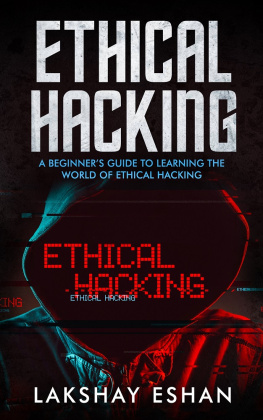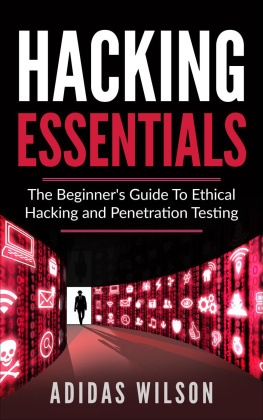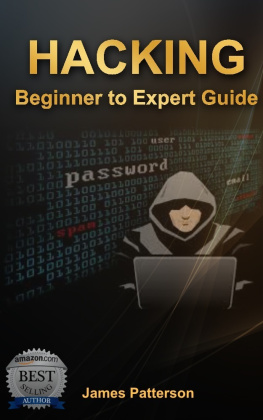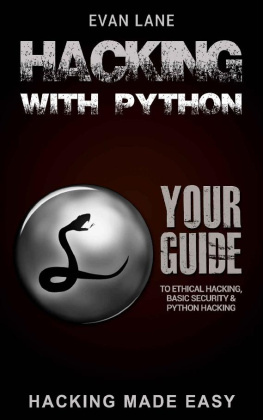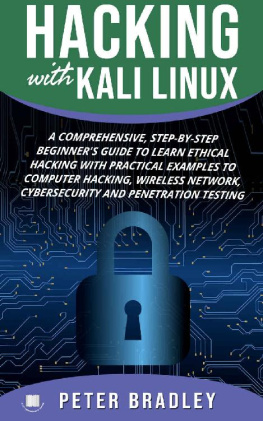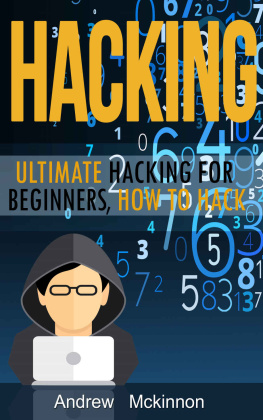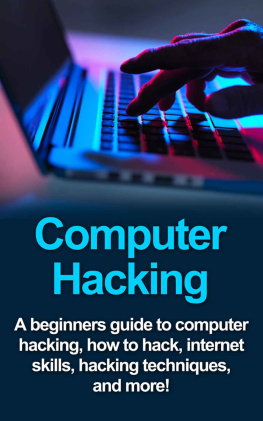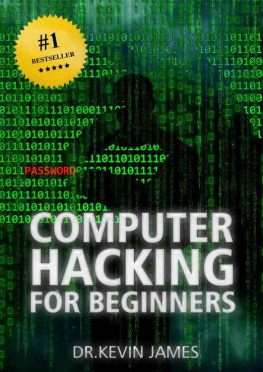All rightsreserved.
Chapter1 Introduction
The general public usually has twocompeting viewpoints of hackers. Some people revere them as brilliantly mindedindividuals while others look down on them as petty criminals. While bothperceptions could be true for many expert hackers, the publics perception hasbeen twisted and contorted by what they see on television dramas and in themovies. Because your average user doesnt understand how a computer or theInternet works from a technical perspective, they cant hope to begin tounderstand what hackers actually do.
In fact, the term hacker usually carriesa negative connotation to it. Ask any non-technical person what a hacker is,and theyll give you a response such as, Theyre the bad guys that stealpeoples credit cards, listen to my phone calls, and work with terroristorganizations. For some reason likely accredited to entertainment media hackers get a bad rap and most people would instantly assume that theirbehaviors are illegal. These stigmas couldnt be further from the truth,because the reality is that there are many types of hackers. Some of them aregood, some of them are bad, and some lie somewhere in between. There is nosingle motivation that drives every hacker and no blanket statement that youcan use to accurately describe every hacker in the world. Also consider thathacking isnt an inherently evil practice and you can do it legally. Somepeople even like to do it for a hobby. More practically, however, some peopleget paid big bucks as consultants to try to hack into a corporate network in aneffort to find security holes. Be forewarned, though. If you start abusing yourknowledge it is a slippery slope to the dark side, and nothing good everhappens once youre there.
If your curiosity has gotten the better ofyou, if you just want to be able to understand whats going on in the moviesand the news, or you have a goal of becoming a competent hacker, I want topersonally introduce you to hacking and guide you to achieving your goals. Theproblem most people have when they want to start hacking is that they findmaterial that isnt written for novitiates. Once you get the basics under yourbelt and you can actually apply the knowledge you will learn in this book,youll find that you are much more educated than your peers and that technologyis actually pretty exciting. As the tools hackers use have changed over thelast couple decades, people that take an interest and develop a passion forhacking have changed as well. Though technology is only getting more complexwith each passing year, the tools hackers utilize are becoming moresophisticated making the learning curve much less steep for newbies.
In this guide, I am going to teach you alot of valuable information about hacking such as:
-What hacking is and what hacking isnt.
-Hacking terminology and hacker culture.
-Types of attacks and the most famoushacks of all time.
-Ethical considerations and fair warningsabout becoming a hacker.
-Fundamental concepts that will serve as afoundation to build hacking skills.
-How to install Linux operating systemsusing VMWare to setup hacking tools.
-Step-by-step guides for ping sweeps andport scanning.
-How to map network topologies and performreconnaissance techniques.
-How to use advanced software to findsecurity holes.
This is designed to be an all-inclusiveguide that will not only give you an understanding of the basic technicalconcepts you will need to become a hacker, but also introduce you to somefascinating software and show you step-by-step how to use it. Im sure most ofyou want to get started hacking right away, but I urge you to spend timelearning the basics before moving on to some of the more challenging attacksdiscussed in this book.
What it Takes to Becomea Good Hacker
One of the reasons some hackers become sosuccessful is because they have a passion for what they are doing. Theirpersonality drives them to tackle extremely difficult challenges, which is whysome hackers break systems just to see if they can. If you are going to want tobecome a prolific hacker, it takes the same two things as any other skill youwant to build: time and practice. If you cant figure something out in thefirst two minutes, dont give up. Some of the pros will spend weeks or even monthsplanning and executing their attacks. And once you get the basics under yourbelt, youre going to be able to implement these techniques in a matter ofminutes. Arguably, I would say the hardest part for a newbie is getting theirenvironment setup. Past that, things start to get easier and you can reallystart to sink your teeth into how the technology works. Before we get to thejuicy details, we should begin with an overview of hacking so you understandsome rudimentary concepts and perceptions about hacking.
Chapter2 - An Overview of Hacking
To your average computer user who doesntunderstand much about Internet and network security, hackers are shrouded in acloud of mystery. Most people dont understand what they do or how they do it.And the movies dont help to demystify them, either. Countless action movies portraya character that takes the role of a hacker that can break into top secretcomputer systems to save the world. When the camera pans over their computerscreens, you see them typing strange letters and numbers into a command promptthat, for all you know, is a foreign language. Humorously enough, the hackersin the movies frequently use a tool called NMAP, which I will show you how touse later in this book. If youve seen The Matrix Reloaded, Dredd, FantasticFour, Bourne Ultimatum, Die Hard 4, or The Girl With The Dragon Tattoo(among countless others), you have already seen actors using NMAP to facilitatetheir hacking endeavors in the movies.
But what exactly is hacking? Hacking meansa lot of different things to a lot of different people. It is an umbrella termused to describe hundreds, if not thousands, of various techniques that can beutilized to use computers and information systems in unintended ways. At itscore, hacking means using a computer to gain unauthorized access to anothercomputer system or data that is protected or restricted. This is the mostconventional meaning of the word hacking. Once a hacker has gained access to anunauthorized system, he or she then has the ability to steal information,change configurations, alter information, delete information, and installfurther malicious code to capture even greater control over the target system.The list goes on and the sky is the limit regarding what an experienced hackercan do once they find a way into a computer system.
However, there is a lot more to hackingthan clicking a button to attack a computer. You will need to use tools andscanners to map the local network topology and use reconnaissance techniques togather information and look for vulnerabilities. The good news for newbies isthat these tools are highly automated today. In the past, hacking softwarehadnt been created that aggregated vast amounts of code and tools into simpleand easy to use commands. As such, hackers in the past needed highly intimateunderstandings of the technologies they were trying to break and it wasdifficult to do so. Having an extremely deep understanding of technology todaywill certainly help you become a better hacker, but my point is that thesetools are becoming increasingly easy to use. In fact, there are young kids andteenagers that are too curious for their own good and take advantage of highlysophisticated tools to break into systems they have no business accessing. Understandthat these tools simplify the hacking process considerably. If a teenager canhack into a system using simple tools, guess what? You can too!


